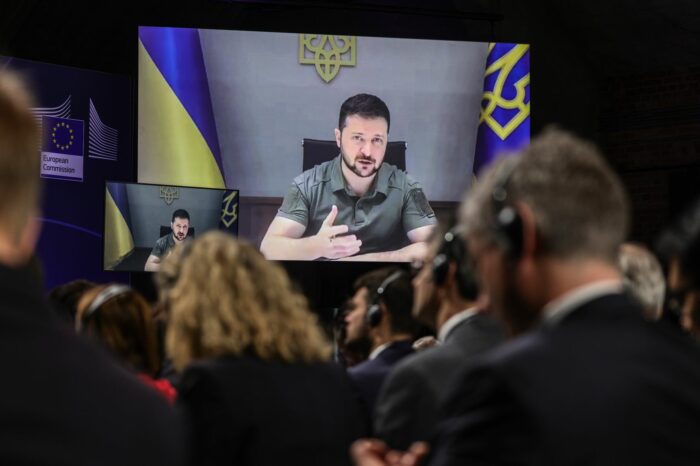Countries win wars through economic resilience, not by force of arms alone. Ukraine’s army is winning battles, but its economy faces a bitter winter. Vladimir Putin knows this, which is why he is bombarding the country’s energy infrastructure. To strengthen Kyiv’s economic hand, the U.S. and the Group of Seven partners need to change Mr. Putin’s calculus. They must force him to recognize that he can’t break Ukraine and that the economic costs of his war will be turned against him.
This week the German government and European Commission hosted a conference in Berlin on Ukraine’s economic plight. Like a similar event in July, the meeting was long on good intentions and short on practical results. Despite references to a Marshall Plan for Kyiv, attendees forgot what the former secretary of state said in his 1947 speech announcing his plan for a war-ravaged Europe: “The patient is sinking while the doctors deliberate.”
Kyiv is fighting a war while coping with losses similar to those of the Great Depression. The country’s economy will shrink by about one-third this year, as inflation has wreaked havoc and tax revenues have collapsed. Kyiv needs about $5 billion a month to cover nonmilitary spending. Out of 43 million Ukrainians, some seven million have become refugees and another seven million have fled within the country.
Mr. Putin has bet that the initial surge of Ukrainian adrenaline would give way to fatigue. The U.S. needs to help turn that gamble against him, which it can do without any direct military intervention.
The U.S. should deploy its best asymmetrical weapon: financial power. In cooperation with its G-7 allies, the U.S. should begin the process under the international law of transferring the more than $300 billion in frozen Russian reserves to Ukraine and other afflicted countries as compensation for Mr. Putin’s aggression.
Various scholars, such as University of Virginia professor Philip Zelikow and Anton Moiseienko of Australian National University, have mapped out how this may work in practice. As Messrs. Zelikow and Moiseienko identify, the United Nations General Assembly recognized in 2002 the International Law Commission’s Articles on the Responsibility of States for Internationally Wrongful Acts.
In combination with several U.N. resolutions and a ruling from the International Court of Justice that have found that Russia has waged a war of aggression, those articles establish the international legal basis for transferring Russia’s reserves to Ukraine. In doing so, the U.S. and allied countries wouldn’t be taking Russian reserves for themselves; they would transfer them to an international fund for compensation.
The U.S. should also propose to the U.N. that frozen Russian reserves could finance a U.N. claims commission to compensate low-income countries victimized by Russia’s shock to food supplies. There’s precedent for such a decision. After Iraq’s invasion of Kuwait in 1990, a U.N. commission awarded more than $50 billion to more than a million claimants, including funds to Kuwait, Iran, Jordan and Saudi Arabia for environmental claims.
Sen. James Risch (R., Idaho), ranking member of the Foreign Relations Committee, has been working with colleagues of both parties on legislation to authorize the transfer. After granting almost $60 billion for Ukraine, Congress and the public can reasonably ask why the U.S. shouldn’t transfer Russian money to Ukraine.
Mr. Putin has violated fundamental international rules and endangered the security of all nations. He’s sought not only to overrun a neighbor but to annex its occupied lands. He has threatened the use of nuclear weapons, not as a deterrent, but as an offensive weapon in a war of conquest. His war has cost poor countries the ability to feed the hungry by disrupting the grain trade.
A U.S.-led financial assault could effectively turn the tables on Mr. Putin and give Ukraine a lifeline to survive and rebuild.
Some Western policy makers are likely to have reservations about the approach. Some may worry, for example, that Russia will retaliate by seizing foreign assets. But it has already done so. If Russia turns to sabotage, it should be forced to pay.
Others may argue that a transfer of Russian reserves risks confidence in the U.S. dollar. But countries hold dollar reserves for reasons of macroeconomic stability, not so they can invade neighbors. China may worry about holding dollar reserves, but Beijing would already substitute other reserves if it could. Its turn toward self-sufficiency and market controls won’t help it create an alternative reserve currency. China and other countries hold dollars because they sell more to the U.S. than they buy. If they dump dollars, they will shrink their sales and economies.
A transfer of Russian reserves respects international law. It also represents a potential item in negotiations to end the war. If Mr. Putin reaches a settlement, Moscow may be able to recover some of its reserves.
The U.S. needs to reset the strategic chessboard. Washington can change the terms of battle by using its strongest economic weapon. By relying on international law, the U.S. would also reinforce the rules-based order that Russia wants to destroy. That would achieve justice as well as peace.
Mr. Zoellick served as U.S. trade representative (2001-05), deputy U.S. secretary of state (2005-06) and World Bank president (2007-12). He is the author of “America in the World.”







